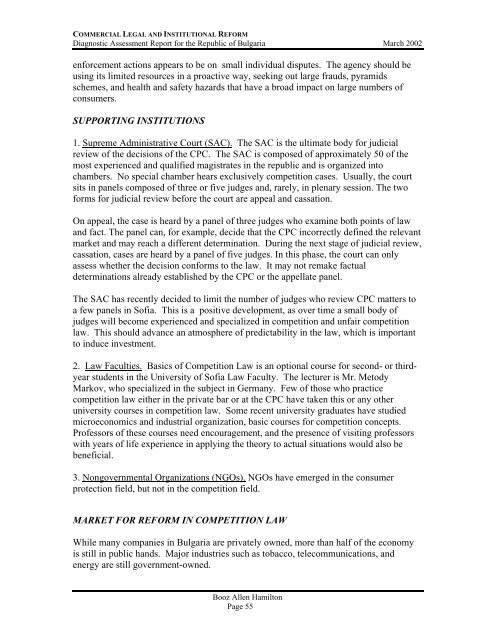Commercial Legal And Institutional Reform (CLIR) - Economic Growth
Commercial Legal And Institutional Reform (CLIR) - Economic Growth
Commercial Legal And Institutional Reform (CLIR) - Economic Growth
You also want an ePaper? Increase the reach of your titles
YUMPU automatically turns print PDFs into web optimized ePapers that Google loves.
COMMERCIAL LEGAL AND INSTITUTIONAL REFORM<br />
Diagnostic Assessment Report for the Republic of Bulgaria March 2002<br />
enforcement actions appears to be on small individual disputes. The agency should be<br />
using its limited resources in a proactive way, seeking out large frauds, pyramids<br />
schemes, and health and safety hazards that have a broad impact on large numbers of<br />
consumers.<br />
SUPPORTING INSTITUTIONS<br />
1. Supreme Administrative Court (SAC). The SAC is the ultimate body for judicial<br />
review of the decisions of the CPC. The SAC is composed of approximately 50 of the<br />
most experienced and qualified magistrates in the republic and is organized into<br />
chambers. No special chamber hears exclusively competition cases. Usually, the court<br />
sits in panels composed of three or five judges and, rarely, in plenary session. The two<br />
forms for judicial review before the court are appeal and cassation.<br />
On appeal, the case is heard by a panel of three judges who examine both points of law<br />
and fact. The panel can, for example, decide that the CPC incorrectly defined the relevant<br />
market and may reach a different determination. During the next stage of judicial review,<br />
cassation, cases are heard by a panel of five judges. In this phase, the court can only<br />
assess whether the decision conforms to the law. It may not remake factual<br />
determinations already established by the CPC or the appellate panel.<br />
The SAC has recently decided to limit the number of judges who review CPC matters to<br />
a few panels in Sofia. This is a positive development, as over time a small body of<br />
judges will become experienced and specialized in competition and unfair competition<br />
law. This should advance an atmosphere of predictability in the law, which is important<br />
to induce investment.<br />
2. Law Faculties. Basics of Competition Law is an optional course for second- or thirdyear<br />
students in the University of Sofia Law Faculty. The lecturer is Mr. Metody<br />
Markov, who specialized in the subject in Germany. Few of those who practice<br />
competition law either in the private bar or at the CPC have taken this or any other<br />
university courses in competition law. Some recent university graduates have studied<br />
microeconomics and industrial organization, basic courses for competition concepts.<br />
Professors of these courses need encouragement, and the presence of visiting professors<br />
with years of life experience in applying the theory to actual situations would also be<br />
beneficial.<br />
3. Nongovernmental Organizations (NGOs). NGOs have emerged in the consumer<br />
protection field, but not in the competition field.<br />
MARKET FOR REFORM IN COMPETITION LAW<br />
While many companies in Bulgaria are privately owned, more than half of the economy<br />
is still in public hands. Major industries such as tobacco, telecommunications, and<br />
energy are still government-owned.<br />
Booz Allen Hamilton<br />
Page 55

















